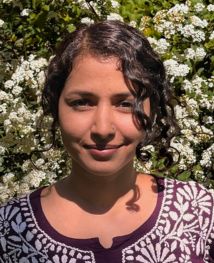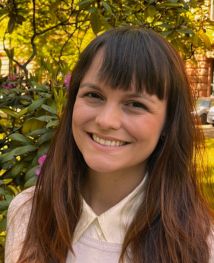How would you describe your journey in mathematics so far?
Alice: It started with a bachelor in physics, so I didn’t go straight into mathematics. But while studying physics, I realized that my favorite university courses were Analysis I, II, and III. That made me think I should move closer to applied analysis and mathematics. It also made me realize that my high school teacher was probably right when he told me: “I think it would be best for you to study mathematics. Of course, there have been ups and downs – periods of low motivation moments of imposter syndrome, asking myself: “Am I good enough to do this?” But in the end, I reminded myself that we’re all doing this job because we’re driven by curiosity, and we enjoy problem-solving. Right now, and looking ahead, I just want to focus on that good feeling I get when I follow my curiosity and try to answer interesting questions.
Monika: I originally wanted to enroll in physics at Delhi University, but on the first day, the cutoff score was very high. I was eligible for mathematics instead, which I also felt good about. Eventually, I accepted the offer for the math, and that’s how it all started. However, at the university, I felt that the teaching was heavily focused on solving problems for exam preparation, with little emphasis on research. That didn’t interest me much. Things changed when I went to the Indian Institute of Technology (IIT) Kanpur for my master’s. That’s where I had amazing teachers – experts working in their fields – because the IITs are among the top institutes in India, with around 10 or 12 institutes across the country. I still remember one professor who taught Analysis I. The way he explained things was incredible. That’s when I thought, “Okay, this is really something,” so I decided to pursue a PhD. During my PhD, I also had a great mentor. But at some points, there were times when I thought maybe I didn’t belong here. You often meet people who say they’ve loved mathematics since childhood, and I started much later. Plus, there aren’t many women in this field, which can be discouraging. But I learned to find joy in small things – like solving a problem. Not necessarily a big research problem, just something you’ve been working on. And when you solve it, you feel happy, and you should take credit for that. Those small wins are where I found motivation and joy.
Have there been any major challenges along the way? How did you overcome them?
Monika: There have been challenges at every step for me as a woman. I think this happens everywhere, but it’s particularly common in India. There’s constant pressure to leave research, get married, and “settle down.” Academia is a long journey filled with uncertainties. By the time you finish your PhD, you are often around 30, and there’s always pressure to start a family. When you refuse to get married, your family still pushes. At the end of the master’s, my family insisted that it was time to get married. But I said then: “Let me just enroll in a PhD program.” The problem is, mathematics is something that requires peace of mind – it’s a creative process. You can’t do it well when you’re under constant emotional pressure. This kind of pressure often affects women, especially in Asia. I’m not sure how it is in other countries. But as a woman, you constantly have to take care of so many things. For example, sometimes you’re judged just for wearing makeup – you’re not taken seriously. People assume you are not focused or committed, simply because of how you present yourself. You constantly have to prove that you’re serious about your work. Whenever you’re giving a talk, or having meetings with senior faculty, you have to be extra careful – just to be taken seriously.
Alice: The situation is somewhat different in Europe, but some issues are very similar. What Monika said about women not being taken seriously – that’s quite common. It’s not just about where you’re from, it’s about the fact that women are still underrepresented in this field. Some male colleagues still struggle to see women as equal professionals, not just as “women,” but as colleagues. That’s frustrating. When a woman gives a seminar or presents a poster, there’s often this lingering doubt: “Are they engaging with me because they’re genuinely interested in my research, or just because I’m a woman?“ There are still daily comments we hear and try to ignore. Take the fellowship Monika and I received – it’s a great opportunity. But I fully expect some male colleagues to say, “They only got it because they’re women.” When we try to open doors for women who face underrepresentation, imposter syndrome, and a lack of visibility, that support is often questioned. It’s perceived as women being “given” things they don’t deserve. So it ends up feeling like women have to constantly prove they’re good enough to be here. Yes, things are improving. There have been efforts and concrete steps taken, but there’s still a lot to be done. In the end, I think the root of the problem lies more in society than in mathematics itself. When those strange or discouraging comments come, I try not to question my own value – I just keep going. It really helps to have structures and networks that support women in this field. Sometimes, when young women or girls face early challenges, they give up because no one is there to say, “You can do it.” You have to be lucky to be surrounded by supportive colleagues who recognize what’s happening and are willing to help. Also, women should support each other rather than compete – which, unfortunately, does sometimes happen. But there’s no space for that kind of division. Up until a few years ago, I didn’t have many women collaborators. One of my recent goals was to change that. Now I’m connecting with more women in my field, and it’s been a wonderful experience. There’s a strong network, and it feels great to have friends and colleagues in the same area who support one another. Women bring unique perspectives, and they deserve to be heard and to contribute fully.





